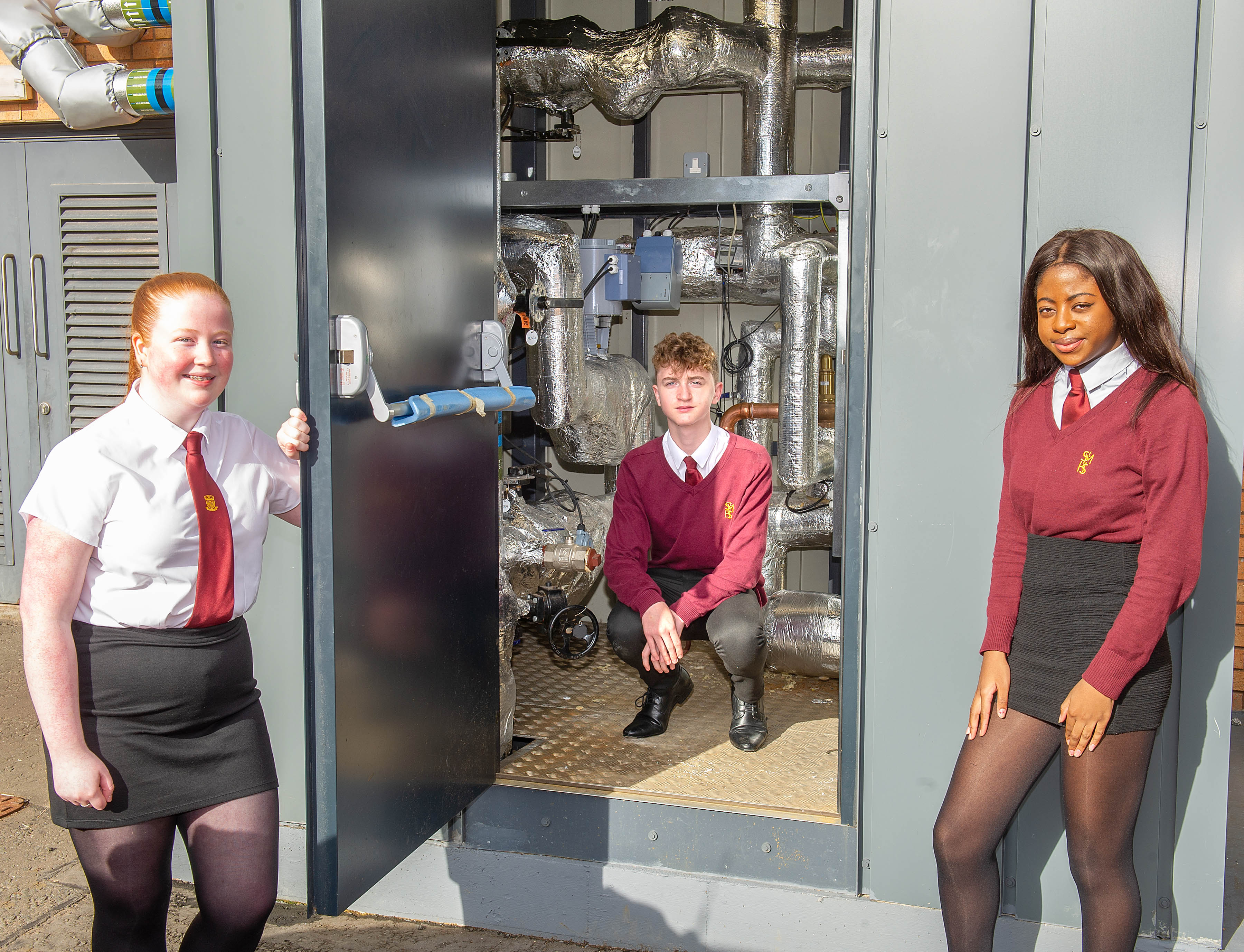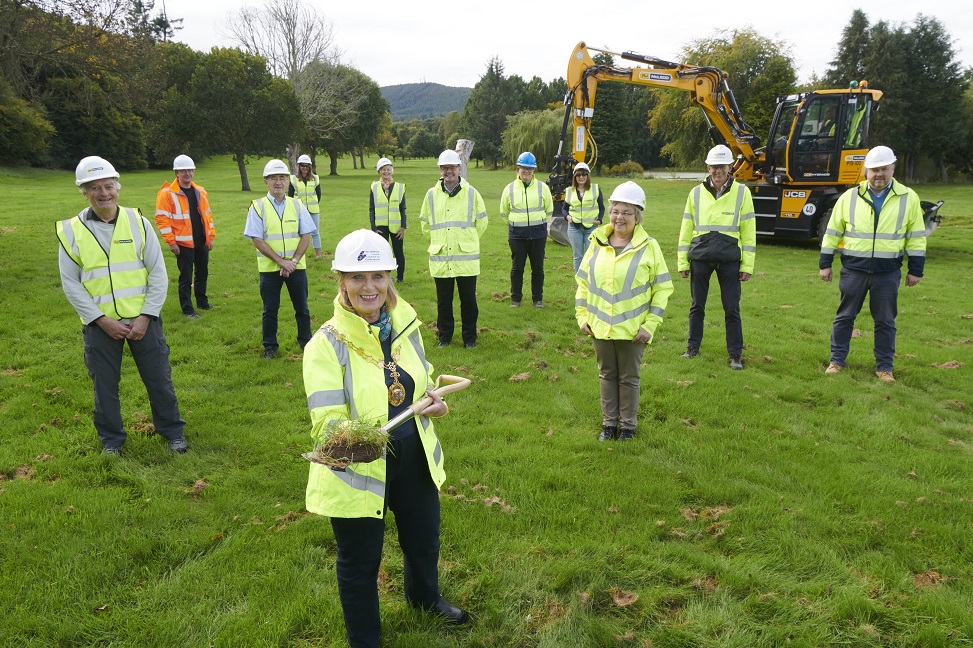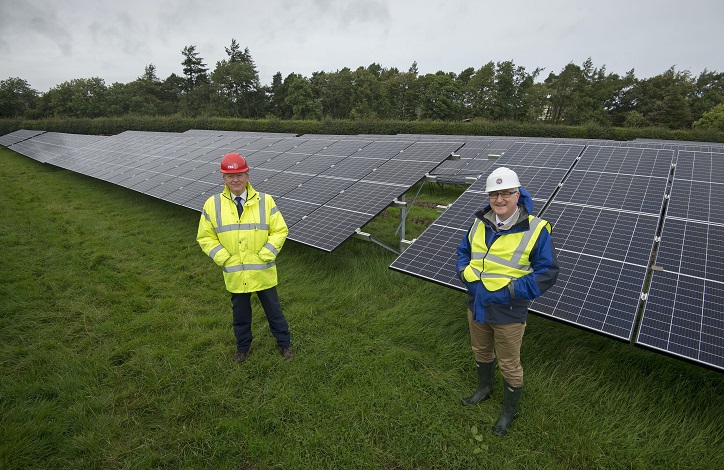Building Briefs - September 17th
- High school enrols in Stirling’s district heating network
St. Modan’s High School will receive top marks for using low cost, low carbon energy after enrolling in Stirling’s pioneering district heating network.

The school was identified as one of Stirling Council’s highest energy consumers in the surrounding area, given its size and function, but will now benefit from reduced carbon emissions and provide cost savings through connection to the ground-breaking district heating network.
St. Modan’s started receiving heat from the facility in Forthside for the return of children and young people to in-school education on August 12. The network provides added heating resilience to the school, with the existing gas fired boilers currently still in place as back-up.
Stirling’s district heating network is the first in the UK to use a mix of cutting-edge renewable technologies to harness energy from waste water. The project delivers cheap, low carbon heat to the city and provides a range of significant environmental and economic benefits.
The £6 million project was delivered by Stirling Council in partnership with Scottish Water Horizons, with support from the Scottish Government’s Low Carbon Infrastructure Transition Programme (LCITP).
Stirling Council owns and operates the district heating network, which will also deliver low carbon and energy cost savings heat to a number of key public buildings, including The Peak Leisure Centre, the Barracks Conference Centre, and organisations such as Zero Waste Scotland and Volunteer Scotland.
- Work on new Inverness Parkrun route gets off the ground
A turf cutting ceremony was held yesterday to mark the start of the construction of a Parkrun track created as part of the ongoing Inverness West Link Stage 2 Works.

The work will consist of the creation of a 5km route on what was the previously Torvean Golf Course. This will form part of a new city park that will be available to the public following completion of the West Link early next year.
Further to a range of consultation, including a workshop with over 100 people at Canal Parks Pavillion in August 2018 and subsequent exhibition in January 2019, this route was identified and incorporated into the Torvean and Ness-side Development Brief, part of the Highland Council’s Development Plan for the area. A promotional video is available from this link – https://www.highland.gov.uk/torvean.
The construction of the circuit will be carried out by the contractor for the West Link Stage 2 project R J McLeod Ltd.
The Parkrun route will become accessible on completion of the Inverness West Link 2 works in the Spring of 2021.
- Solar farm on campus boosts University of Edinburgh’s zero carbon bid
A solar farm that will play a vital role in helping the University of Edinburgh become carbon neutral by 2040 is nearing completion.

Charles Easton, director, FES Support Services Limited (left), and the University’s director of social responsibility and sustainability, Dave Gorman
Almost 5000 ground-mounted panels are now being installed at Easter Bush campus in Midlothian in a move that will save an estimated £200,000 per year in electricity costs. Installation is due to finish in November.
The five-hectare site will be connected to the world-renowned Royal (Dick) School of Veterinary Studies and the Roslin Institute.
Its photovoltaic (PV) panels are expected to generate more than 1,400,000 kWh of electricity a year, which is roughly the same as that needed to supply 500 typical homes.
The solar farm – one of the first to be housed on a University campus – will provide 15% of the Easter Bush site’s electricity consumption.
Together with existing generation capacity, 60 per cent of Easter Bush’s electricity, and 30% of its heat, will be generated on site from low or zero-carbon technologies.
The Easter Bush development includes a ‘living laboratory’ for solar PV research, enabling researchers to investigate improved methods of generating green power.
The University of Edinburgh was an early adopter of PV technology. Its first panels were installed at its King’s Buildings campus in 2007 and have since generated nearly 1,000MWh.
In recent years, the University’s solar installations have generated an average of 265MWh of electricity annually. The new development will substantially increase that figure, to an average annual figure of 4,500 MWh, which will save more than 1,000 tonnes of carbon emissions each year.
Edinburgh’s ambition of becoming carbon neutral by 2040 represents one aspect of the University’s commitment to social and civic responsibility and to meeting the UN’s Sustainable Development Goals.
- BESA Conference moves online
The annual BESA National Conference and Exhibition will be held online this year on November 4 and 5.
The Association said it had taken the decision to “embrace technology and move to a virtual platform” in response to the extraordinary circumstances facing the industry.
The Conference will look to build on the success of BESA’s series of daily webinars that kept the industry updated on commercial, business and health & safety developments throughout the COVID-19 crisis. These were a huge success reaching an audience of more than 20,000 between March and August.
With discussion topics spread across a main digital auditorium and a series of smaller virtual seminars, there will be content to suit all building engineering interests. Delegates will even be able to ‘network’ in specially designated areas and there will be a virtual exhibition hall to showcase the latest products.
BESA is gathering an impressive line-up of high-profile speakers including the return of World Health Organisation advocate Rosamund Adoo Kissi-Debrah. Last year her inspirational session on the links between air quality and child health was heavily oversubscribed; and she is returning to update the industry on legal and political developments – and to exhort it to step up its efforts to turn buildings into ‘safe havens’ from air pollution.
There will be series of plenary presentations covering topics from the impact of government rebuilding plans to new building safety legislation as well as the Future of Cities, training and skills linked to the need for improved diversity in the building engineering workforce.
These will be complemented by a series of technical sessions drilling down into the detail of developments in heating, ventilation, air conditioning, refrigeration, indoor air quality, fire safety and smoke control, digital systems, off-site manufacture, ductwork and pipework – including updates on industry standards and best practice guidance.
There will also be tailored business seminars to help firms capitalise on the economic recovery and ‘BESA Clinics’ providing support and advice for members from the Association’s technical, legal, commercial, employment and health & safety teams.
The two-day event will be free to attend, but BESA is asking attendees to make a contribution to its recently establishedIT poverty fund. This seeks to address the problem many young people have in accessing laptops and tablets so they can learn the skills and competencies needed to join the building engineering industry.
- Plans for latest phase of Borders play parks programme unveiled
A series of new play parks will be created in 2020/2021 as part of Scottish Borders Council’s £4.8 million play parks and community outdoor spaces programme.
Play parks in Peebles, Duns, Eyemouth and Newtown St Boswells are all part of SBC’s plans for this financial year.
The play parks and outdoor community spaces programme has already led to seven modern and inclusive play facilities being opened across the Borders in the last three years, alongside a significant £250,000 contribution to the already popular new pump track at Wilton Lodge Park in Hawick, which opened this summer.
The 2020/2021 programme is set to begin with a new destination play park in Victoria Park in Peebles, which is currently going through the planning process.
If the Peebles play park secures planning permission, it is hoped construction will commence before the end of 2020 and will be open by spring 2021.
The facility would include state-of-the-art play equipment catering for children aged two to 14 years of age and safety surfacing.
It would also include play equipment for young people with additional needs, which is a major consideration in the new development, alongside park benches for families to use.
If approved, the new Peebles play park would also see a new bike pump track created alongside it and an existing football area will be maintained and enhanced with the inclusion of ball-walls. A new woodland walk is also proposed alongside the play park development.
There are also plans to deliver a skate park in Peebles, again alongside the play area, which are being drawn together with the Peebles Skate Park Group.
Designs for the play parks in Duns, Eyemouth and Newtown are currently being finalised and the proposals for these communities will be announced in the coming weeks.
As part of the programme, there are also plans for a new play area and skate park in Jedburgh, a new skate park in Galashiels and a series of youth/fitness shelters.











